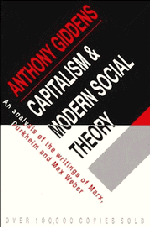Postscript: Marx and modern sociology
Published online by Cambridge University Press: 05 August 2013
Summary
There are two polar sorts of orthodoxy in terms of which the relationship between Marx's writings and those of the other two authors discussed at length in this book, is usually presented. The first, adopted by many western sociologists, holds that Marx's works belong to the ‘pre-history’ of social thought; and that the history of sociology proper only begins with the generation of writers to which Durkheim and Weber belonged. The second is that usually expressed by Marxists, and holds that the works of this subsequent generation of social thinkers represent nothing more than a bourgeois response to Marx – and that, consequently, most of what passes for ‘sociology’ can be dismissed as simply a latter-day expression of liberal bourgeois ideology. Each of these orthodoxies contains more than a substance of truth; and each is dangerously misleading.
The first standpoint rests upon straightforward acceptance of the stated views of the writers of the generation of Durkheim and Weber, that their own work was ‘scientific’ in its formulation, and thereby different substantially from the grandiose, ‘speculative’ constructions of earlier nineteenth-century writers. Those who have accepted this view, by and large, have defined as irrelevant the social and political circumstances in which Durkheim, Weber, and their contemporaries developed their ideas, and have consequently largely ignored the broader Weltanschauung which, in each case, was intrinsically bound up with the academic writings of the thinker in question.
- Type
- Chapter
- Information
- Capitalism and Modern Social TheoryAn Analysis of the Writings of Marx, Durkheim and Max Weber, pp. 243 - 247Publisher: Cambridge University PressPrint publication year: 1971



